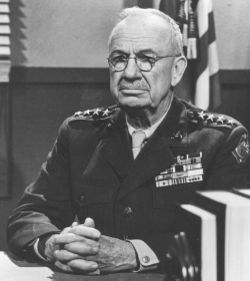Smith.

This is coolbert:
Don Wade and Roma, on WLS 890 Chicago talk radio this morning are talking to Marine General Ron Christmas about the dedication of the U.S. Marine Corps museum. Dedicated today by President Bush in Quantico, VA.
It was announced at the dedication that a Marine is being awarded the Medal of Honor for heroism in Iraq. It is a posthumous award. This is quite often the case with the Medal of Honor.
Hunter, the son of the Don and Roma, is a currently serving Marine officer who has done tour[s] in Iraq. So anything regarding the U.S. Marines is of keen interest to this pair of talk show hosts.
Don asks the General about the Clint Eastwood directed move, "Flags Of Our Fathers". Don questions General Christmas if he, the general, feels that the movie is an accurate depiction of events. And the general says he feels it is so.
Don Wade then goes on to say that just as there is controversy with the policies, strategies, and tactics being used in present day Iraq, there was AT THE TIME, controversy regarding Iwo Jima too. Once suggestion made AT THE TIME was that too few troops were used for the landing at Iwo.
And this has been, ever since 1945, been a criticism of the strategy followed by the senior Marine commanders.
It is true that the Marines had three divisions of troops present at Iwo. ONLY two of those divisions were sent ashore. One of course being held in reserve. Criticism suggests that ALL THREE DIVISIONS should have been sent into the Iwo inferno.
General Holland M. Smith ["Howlin' Mad], overall American commander at Iwo, DID make the conscious decision to retain one fresh division of Marines in reserve.

That the one fresh division present aboard ships was NOT committed has been a grave error in the eyes of some. Especially as the resistance on Iwo Jima was beyond pre-invasion expectations.
But, as even General Christmas said, hindsight is always 20/20.
H.M. Smith had future considerations in mind when he decided NOT to send that reserve division ashore.
This consideration centered around "Downfall". The invasion of Japan that would have commenced in the fall of 1945.
Smith was NOT privy to the atomic bomb secret. Indeed, at the time of the Iwo landings, the first atomic detonation had not even been accomplished. Smith had the invasion of Japan in mind when he DID NOT commit that fresh division.
"many proud regiments suffered devastating losses. With these same units already designated as key components of the landing force against the Japanese home islands, such losses had serious potential implications. These factors may well have influenced General Holland Smith's unpopular decision to withhold the 3d Marines from the battle. From the perspective of an exhausted company commander on Iwo Jima, Smith's decision seemed inexcusable, then and now; from the wider perspective of the commanding general, Fleet Marine Forces, Pacific, the decision makes more sense."
Sending another division into the bloodbath of Iwo would have been, from a manpower standpoint, with an eye to the future, a big mistake.
It is important to remember, that all throughout the Pacific campaign, those island landings on Jap held islands usually resulted in very heavy casualties for the American forces. Battlefield casualties were accompanied by a LOT of non-combat casualties, mental and disease both. Entire units had to be withdrawn to a rear area for refitting and recuperation after battles such as occurred on Guadalcanal and Tarawa.
Rather than debilitate through combat ANOTHER whole division on Iwo Jima, Smith decided to proceed with the plan as originally conceived [two divisions ashore/one in reserve].
It may also be the case that trying to put ashore three divisions of Marines at once on such a small island as Iwo Jima would not have been feasible. NOT enough terrain and land space period to deploy three divisions simultaneously and have them work harmoniously. Unit frontages and boundaries would have been too congested to apply tactics and doctrine as practiced in training with effectiveness.
coolbert.
Labels: WW2

0 Comments:
Post a Comment
Subscribe to Post Comments [Atom]
<< Home